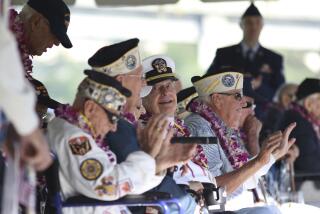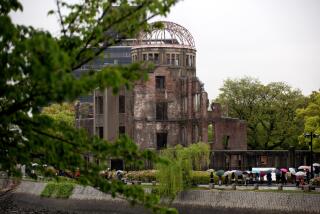H. Potter, 83; Navigator on Doolittle Raid
- Share via
Henry Potter, who served as Lt. Col. Jimmy Doolittle’s navigator during the daring bombing raid on Japan that boosted American morale four months after the attack on Pearl Harbor, has died. He was 83.
Potter, a retired Air Force colonel, died Monday, the Memorial Day holiday, after a long illness in a hospital in Austin, Texas, his home since 1967.
At 8:20 a.m. on April 18, 1942, 16 B-25 bombers began taking off from the aircraft carrier Hornet 600 miles east of Japan. Doolittle’s bomber was No. 1.
“When we launched, it was stormy, waves breaking over the ship,” Potter told the Minneapolis Star Tribune in 1992. “Over Japan, it was a beautiful day. The sun was shining, and I suppose on the ground the birds were singing.”
As Doolittle’s raiders flew at low altitude across Japan, they bombed dozens of military targets in and around Tokyo, Yokohama and three other cities. Doolittle then led his planes toward airstrips in south-central China.
It was night by the time they reached the China coast. They had run into a severe storm and their fuel was gone. Doolittle pulled his plane up to 8,000 feet and he, Potter and the other crew members bailed out.
One of the 16 bombers landed in the Soviet Union, according to a War Department report; the others landed in the water near the China coast or crashed on land after the crews bailed out.
All 80 crew members made it to the ground safely, but eight of them were captured by the Japanese, according to the report. Three were executed, one died in prison and four were released when the war ended.
The surprise Doolittle Raid stunned the Japanese, who had believed their homeland was invulnerable.
All of the men had volunteered to work on the unnamed secret mission.
“I don’t think we exhibited any more courage than anyone else,” Potter said in 1990. “I don’t think any of us thought about anything other than that we were doing our jobs.”
Born in Pierre, S.D., in 1918, Potter attended Yankton College in South Dakota and the University of Oregon. He entered the Army in 1940. After completing navigator training, he was commissioned a 2nd lieutenant in June 1941.
Potter, whose wartime decorations included the Distinguished Flying Cross and Air Medal with three oak leaf clusters, retired from the Air Force in 1970.
In 1990, he joined an expedition to China to search for the planes that were downed after the historic raid on Japan. Among the remains found were those of the Doolittle bomber.
“It was a wonderful experience for him,” said his daughter, Teresa Potter White. “He had nothing but wonderful thoughts for the Chinese. They saved their lives, protected and helped hide them from the Japanese.”
Potter, who later flew missions over North Africa, didn’t talk much about his historic bombing run over Japan when his children were growing up.
“He was a very modest man,” his daughter said. “When I was young, it was like pulling teeth to get him to talk about it. I’d say, ‘Parachuting in rain and thunder, were you scared?’ He’d say, ‘I don’t remember.’ ‘Sure you do.’”
Her father started talking publicly about the famous mission later in life, though, she said.
“People stopped him all the time,” she said. “He loved talking to people and sharing with them. He loved his country, and believed we don’t want history to repeat itself.”
Doolittle’s Raiders had their first reunion in 1943 and, with a few exceptions, they then held one every year. Potter, who attended every get-together and had served as the group’s president, was too ill to attend the one in April.
In addition to his daughter, Potter is survived by his five other children, Karen Pardue, Cheryl Sharp, Cynthia Gilcrest, Monica Love and Steven Potter; 10 grandchildren; and a great-granddaughter.
More to Read
Sign up for Essential California
The most important California stories and recommendations in your inbox every morning.
You may occasionally receive promotional content from the Los Angeles Times.










